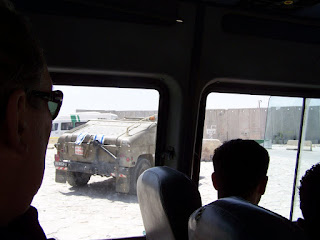Earlier this week, the BBC’s Panorama programme featured a depressing episode entitled Return to Gaza in which Jane Corbin bravely returned - six weeks after kidnapped BBC journalist Alan Johnston’s release - to that strip of land forsaken by the entire world .
In introducing the episode, Jeremy Vine observed that Gaza “could be a holiday destination like Turkey or Egypt”. And, in an ideal future world, it might become that. Now people are keener to flee it than flock to “what is basically now a huge prison”, as Corbin put it as she walked through the gates of the imposing Israeli wall surrounding the tiny slither of territory.
Watching the miserable situation on our TV drove home just how much the Palestinian people have been let down by the international community, Israel and their own leadership.
Already worn down by food shortages, rampant unemployment, an unending Israeli siege and weeks of near civil war, at about the same time Panorama aired, hundreds of thousands of Gaza residents had their bleak situation made blacker when the EU effectively switched off one of Gaza’s main power station because it feared that some of the revenue was being siphoned off by Hamas.
Corbin toured Gaza and saw the influence of its Hamasisation everywhere, including a gutted nightclub where the corrupt Fatah elite used to hangout. Despite the more restrictive Islamic influence, Hamas has also been providing Gazans with some entertainment by playing the popularity game. Corbin showed footage of bulldozers removing the barriers set up around exclusive Fatah beaches, declaring them open to all Gazans.
All my books were destroyed
One of the most touching parts of the documentary was when Amani al-Dramli, a bright and sensitive 21-year-old physiotherapy student, showed Corbin around her family’s destroyed apartment which had been hit by a rocket during the “battle of the rooftops” between Fatah and Hamas, as Corbin described it.
Calm until she entered her burnt-out study, she could barely suppress a tear when she told Corbin that all her books had been destroyed in the fire and she could no longer study without them. Her mother, unable to contain her anger, said that if Hamas and Fatah couldn’t agree among themselves, then: “We want neither of them!!!”
Articulating the 'flight' impulse many young Palestinians feel, including some I had met in the West Bank, al-Dramli said that she and her family were waiting for the border to re-open so that they could join other family members working in Saudi. “Life is easy and comfortable there,” she said sadly.
Katleen wondered how terrible it must be for all these highly educated Palestinians – still among the best-educated in the Arab world, despite all the Israeli closures and socio-economic problems they face – losing their youth in a straitjacket of unemployment, despair and destitution.
The main error Corbin made in her reportage was to claim that Hamas was unwilling to talk to Israel. In fact, considering its past, Hamas showed a great deal of pragmatism in the months following its electoral success. Faced with the reality of actual rule, it was seriously moderating its position vis-à-vis Israel, and said everything short of outright recognition of Israel – which for anyone who bothered to read between the lines meant that they were providing Israel with de facto recognition in a face-saving manner.
Rather than engage Hamas and woe it to further moderation, Israel brought down its iron fist and the international community followed suit. Does no one realise that strangling a people and robbing it of hope actually radicalises it more? Where is the humanity in all this? Does Israel really want an angrier neighbour? For how much longer will Israel continue actively to rear uglier monsters – after all, it once backed Hamas as a counterbalance against the then despised Fatah, today its doing the opposite, even though there are factions of Fatah, such as the Al Aqsa Martyrs Brigade, which may well use the weapons against Israel in the future – which it then turns around and tries to slay or starve?
I can understand what makes the Israeli public afraid but there are far more sensible ways of gaining security than this collective oppression.
Watch this episode of Panorama

